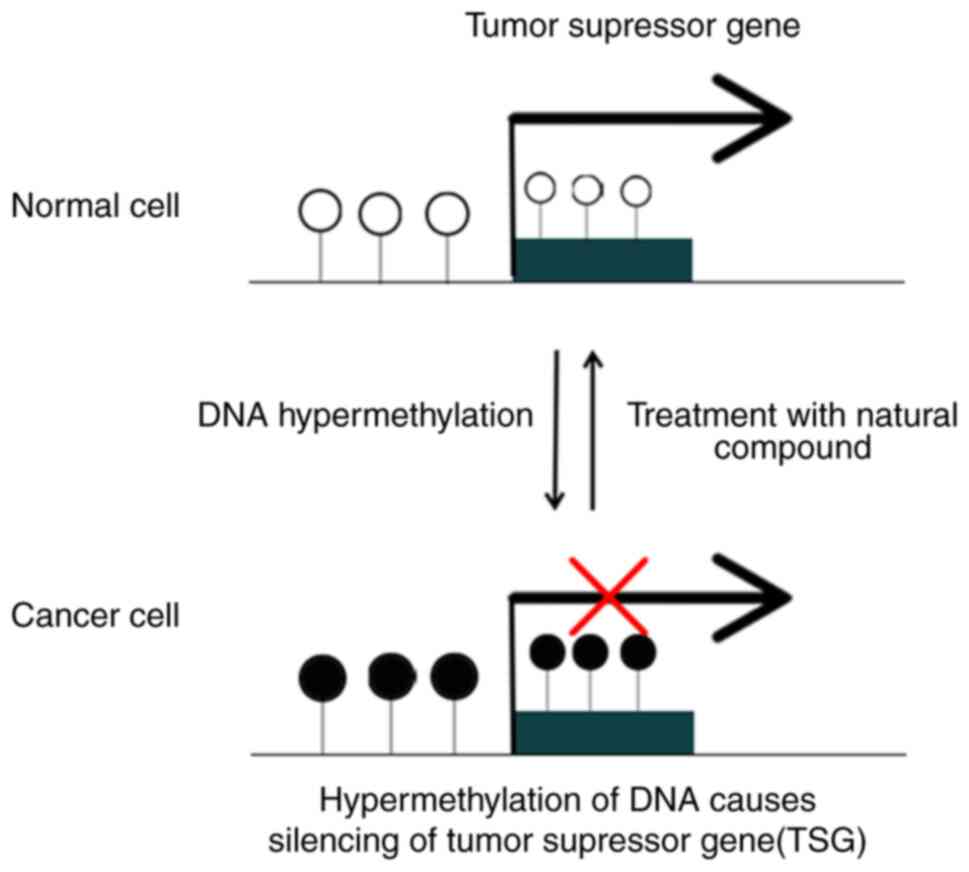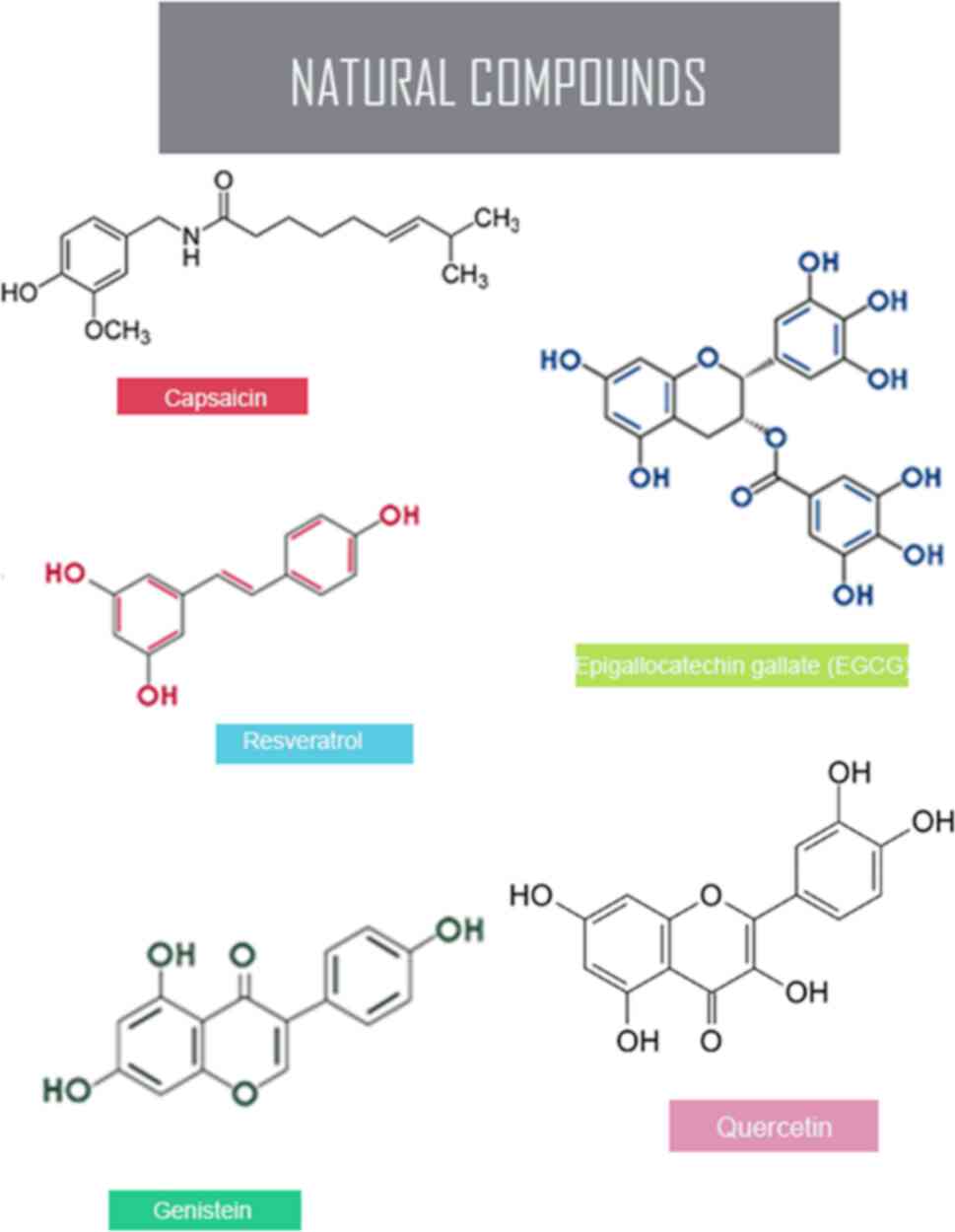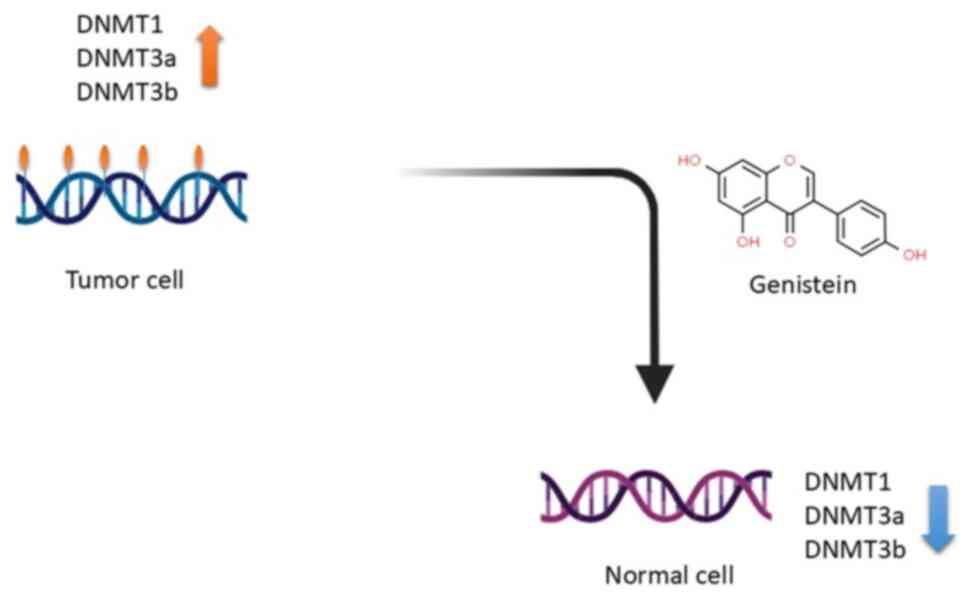|
1
|
Hanahan D and Weinberg RA: Hallmarks of
cancer: The next generation. Cell. 144:646–674. 2011.PubMed/NCBI View Article : Google Scholar
|
|
2
|
Aggarwal R, Jha M, Shrivastava A and Jha
AK: Natural compounds: Role in reversal of epigenetic changes.
Biochemistry (Mosc). 80:972–989. 2015.PubMed/NCBI View Article : Google Scholar
|
|
3
|
Suter MA and Aagaard-Tillery KM:
Environmental influences on epigenetic profiles. Semin Reprod Med.
27:380–390. 2009.PubMed/NCBI View Article : Google Scholar
|
|
4
|
Yadav P, Chakraborty P, Jha NK, Dewanjee
S, Jha AK, Panda SP, Mishra PC, Dey A and Jha SK: Molecular
mechanism and role of Japanese encephalitis virus infection in
central nervous System-mediated diseases. Viruses.
14(2686)2022.PubMed/NCBI View Article : Google Scholar
|
|
5
|
Ehrlich M: DNA hypermethylation in
disease: Mechanisms and clinical relevance. Epigenetics.
14:1141–1163. 2019.PubMed/NCBI View Article : Google Scholar
|
|
6
|
Moore LD, Le T and Fan G: DNA methylation
and its basic function. Neuropsychopharmacology. 38:23–38.
2013.PubMed/NCBI View Article : Google Scholar
|
|
7
|
Gordaliza M: Natural products as leads to
anticancer drugs. Clin Transl Oncol. 9:767–776. 2007.PubMed/NCBI View Article : Google Scholar
|
|
8
|
Kumar U, Sharma U and Rathi G: Reversal of
hypermethylation and reactivation of glutathione S-transferase pi 1
gene by curcumin in breast cancer cell line. Tumour Biol.
39(1010428317692258)2017.PubMed/NCBI View Article : Google Scholar
|
|
9
|
Li JW and Vederas JC: Drug discovery and
natural products: End of an era or an endless frontier? Science.
325:161–165. 2009.PubMed/NCBI View Article : Google Scholar
|
|
10
|
Dammann RH, Richter AM, Jiménez AP, Woods
M, Küster M and Witharana C: Impact of natural compounds on DNA
methylation levels of the tumor suppressor gene RASSF1A in cancer.
Int J Mol Sci. 18(2160)2017.PubMed/NCBI View Article : Google Scholar
|
|
11
|
Das PM and Singal R: DNA methylation and
cancer. J Clin Oncol. 22:4632–4642. 2004.PubMed/NCBI View Article : Google Scholar
|
|
12
|
Nikbakht M, Jha AK, Malekzadeh K, Askari
M, Mohammadi S, Marwaha RK, Kaul D and Kaur J: Aberrant promoter
hypermethylation of selected apoptotic genes in childhood acute
lymphoblastic leukemia among North Indian population. Exp Oncol.
39:57–64. 2017.PubMed/NCBI
|
|
13
|
Jha AK, Sharma V, Nikbakht M, Jain V,
Sehgal A, Capalash N and Kaur J: A comparative analysis of
methylation status of tumor suppressor genes in paired biopsy and
serum samples from cervical cancer patients among north Indian
population. Russ J Genet. 52:226–230. 2016.PubMed/NCBI View Article : Google Scholar
|
|
14
|
Saloni Sharma A, Goel H, Pal S, Rai P,
Rawat K, Syeda S, Shrivastava A and Kumar Jha A: Demethylation of
RASSF1A gene by quercetin and eugenol in heLa cancer cell line. Int
J Health Sci Res. 9:29–34. 2019.
|
|
15
|
Dixon RA and Ferreira D: Genistein.
Phytochemistry. 60:205–211. 2002.PubMed/NCBI View Article : Google Scholar
|
|
16
|
Fang MZ, Chen D, Sun Y, Jin Z, Christman
JK and Yang CS: Reversal of hypermethylation and reactivation of
p16INK4a, RARbeta, and MGMT genes by genistein and other
isoflavones from soy. Clin Cancer Res. 11:7033–7041.
2005.PubMed/NCBI View Article : Google Scholar
|
|
17
|
Majid S, Dar AA, Shahryari V, Hirata H,
Ahmad A, Saini S, Tanaka Y, Dahiya AV and Dahiya R: Genistein
reverses hypermethylation and induces active histone modifications
in tumor suppressor gene B-Cell translocation gene 3 in prostate
cancer. Cancer. 116:66–76. 2010.PubMed/NCBI View Article : Google Scholar
|
|
18
|
Adjakly M, Bosviel R, Rabiau N, Boiteux
JP, Bignon YJ, Guy L and Bernard-Gallon D: DNA methylation and soy
phytoestrogens: Quantitative study in DU-145 and PC-3 human
prostate cancer cell lines. Epigenomics. 3:795–803. 2011.PubMed/NCBI View Article : Google Scholar
|
|
19
|
Li H, Xu W, Huang Y, Huang X, Xu L and Lv
Z: Genistein demethylates the promoter of CHD5 and inhibits
neuroblastoma growth in vivo. Int J Mol Med. 30:1081–1086.
2012.PubMed/NCBI View Article : Google Scholar
|
|
20
|
He F and Chen JQ: Consumption of soybean,
soy foods, soy isoflavones and breast cancer incidence: Differences
between Chinese women and women in Western countries and possible
mechanisms. Food Sci Hum Wellness. 2:146–161. 2013.
|
|
21
|
Xie Q, Bai Q, Zou LY, Zhang QY, Zhou Y,
Chang H, Yi L, Zhu JD and Mi MT: Genistein inhibits DNA methylation
and increases expression of tumor suppressor genes in human breast
cancer cells. Genes Chromosomes Cancer. 53:422–431. 2014.PubMed/NCBI View Article : Google Scholar
|
|
22
|
Sundaram MK, Ansari MZ, Al Mutery A,
Ashraf M, Nasab R, Rai S, Rais N and Hussain A: Genistein induces
alterations of epigenetic modulatory signatures in human cervical
cancer cells. Anticancer Agents Med Chem. 18:412–421.
2018.PubMed/NCBI View Article : Google Scholar
|
|
23
|
Saha D, Vaishnav N, Ahsan Z, Rani N,
Mathur R and Jha AK: Reversal of hypermethylation and reactivation
of tumor suppressor genes due to natural compounds in breast cancer
cells. Int J Biol Innovations. 2:63–75. 2020.
|
|
24
|
Chapa-Oliver AM and Mejía-Teniente L:
Capsaicin: From plants to a cancer-suppressing agent. Molecules.
21(931)2016.PubMed/NCBI View Article : Google Scholar
|
|
25
|
Sharan M, Jha M, Chandel R, Syeda S,
Mathur R, Jha NK, Jha AK, Goel H, Shrivastava A, Chauhan S, et al:
Demethylation of CADM1 and SOCS1 using capsaicin in cervical cancer
cell line. Naunyn Schmiedebergs Arch Pharmacol. 396:649–657.
2023.PubMed/NCBI View Article : Google Scholar
|
|
26
|
Sanchez AM, Sanchez MG, Malagarie-Cazenave
S, Olea N and Diaz-Laviada I: Induction of apoptosis in prostate
tumor PC-3 cells and inhibition of xenograft prostate tumor growth
by the vanilloid capsaicin. Apoptosis. 11:89–99. 2006.PubMed/NCBI View Article : Google Scholar
|
|
27
|
Sharan M, Ravinuthala RP, Mathur R, Khare
N and Jha AK: In silico study of the effect of capsaicin against
hypermethylation of TSLC1 to cure cervical cancer. GIS Sci J.
8:1159–1176. 2021.
|
|
28
|
Li Y and Tollefsbol TO: Impact on DNA
methylation in cancer prevention and therapy by bioactive dietary
components. Curr Med Chem. 17:2141–2151. 2010.PubMed/NCBI View Article : Google Scholar
|
|
29
|
Fang MZ, Wang Y, Ai N, Hou Z, Sun Y, Lu H,
Welsh W and Yang CS: Tea polyphenol (-)-epigallocatechin-3-gallate
inhibits DNA methyltransferase and reactivates methylation-silenced
genes in cancer cell lines. Cancer Res. 63:7563–7570.
2003.PubMed/NCBI
|
|
30
|
Nandakumar V, Vaid M and Katiyar SK:
(-)-Epigallocatechin-3-gallate reactivates silenced tumor
suppressor genes, Cip1/p21 and p16INK4a, by reducing DNA
methylation and increasing histones acetylation in human skin
cancer cells. Carcinogenesis. 32:537–544. 2011.PubMed/NCBI View Article : Google Scholar
|
|
31
|
Khan MA, Hussain A, Sundaram MK, Alalami
U, Gunasekera D, Ramesh L, Hamza A and Quraishi U:
(-)-Epigallocatechin-3-gallate reverses the expression of various
tumor-suppressor genes by inhibiting DNA methyltransferases and
histone deacetylases in human cervical cancer cells. Oncol Rep.
33:1976–1984. 2015.PubMed/NCBI View Article : Google Scholar
|
|
32
|
Long NK, Kato K, Yamashita T, Makita H,
Toida M, Hatakeyama D, Hara A, Mori H and Shibata T:
Hypermethylation of the RECK gene predicts poor prognosis in oral
squamous cell carcinomas. Oral Oncol. 44:1052–1058. 2008.PubMed/NCBI View Article : Google Scholar
|
|
33
|
Alizadeh M, Nafari A, Safarzadeh A,
Veiskarami S, Almasian M and Asghar Kiani A: The impact of EGCG and
RG108 on SOCS1 promoter DNA methylation and expression in U937
leukemia Cells. Rep Biochem Mol Biol. 10:455–461. 2021.PubMed/NCBI View Article : Google Scholar
|
|
34
|
Agarwal A, Kansal V, Farooqi H, Prasad R
and Singh VK: Epigallocatechin gallate (EGCG), an active phenolic
compound of green tea, inhibits tumor growth of head and neck
cancer cells by targeting DNA hypermethylation. Biomedicines.
11(789)2023.PubMed/NCBI View Article : Google Scholar
|
|
35
|
Morris J, Moseley VR, Cabang AB, Coleman
K, Wei W, Garrett-Mayer E and Wargovich MJ: Reduction in promotor
methylation utilizing EGCG (epigallocatechin-3-gallate) restores
RXRα expression in human colon cancer cells. Oncotarget.
7:35313–35326. 2016.PubMed/NCBI View Article : Google Scholar
|
|
36
|
Stefanska B, Salamé P, Bednarek A and
Fabianowska-Majewska K: Comparative effects of retinoic acid,
vitamin D and resveratrol alone and in combination with adenosine
analogues on methylation and expression of phosphatase and tensin
homologue tumour suppressor gene in breast cancer cells. Br J Nutr.
107:781–790. 2012.PubMed/NCBI View Article : Google Scholar
|
|
37
|
Thakur VS, Deb G, Babcook MA and Gupta S:
Plant phytochemicals as epigenetic modulators: Role in cancer
chemoprevention. AAPS J. 16:151–163. 2014.PubMed/NCBI View Article : Google Scholar
|
|
38
|
Khan MI, Rath S, Adhami VM and Mukhtar H:
Targeting epigenome with dietary nutrients in cancer: Current
advances and future challenges. Pharmacol Res. 129:375–387.
2018.PubMed/NCBI View Article : Google Scholar
|
|
39
|
Kang S, Wang Z, Li B, Gao X, He W, Cao S
and Chen H: Anti-tumour effects of resveratrol on malignant
melanoma is associated with promoter demethylation of RUNX3 gene.
Pharmazie. 74:163–167. 2019.PubMed/NCBI View Article : Google Scholar
|
|
40
|
Qin W, Zhang K, Clarke K, Weiland T and
Sauter ER: Methylation and miRNA effects of resveratrol on mammary
tumors vs. normal tissue. Nutr Cancer. 66:270–277. 2014.PubMed/NCBI View Article : Google Scholar
|
|
41
|
Gibellini L, Pinti M, Nasi M, Montagna JP,
De Biasi S, Roat E, Bertoncelli L, Cooper EL and Cossarizza A:
Quercetin and cancer chemoprevention. Evid Based Complement
Alternat Med. 2011(591356)2011.PubMed/NCBI View Article : Google Scholar
|
|
42
|
Lugli E, Ferraresi R, Roat E, Troiano L,
Pinti M, Nasi M, Nemes E, Bertoncelli L, Gibellini L, Salomoni P,
et al: Quercetin inhibits lymphocyte activation and proliferation
without inducing apoptosis in peripheral mononuclear cells. Leuk
Res. 33:140–150. 2009.PubMed/NCBI View Article : Google Scholar
|
|
43
|
Samuel T, Fadlalla K, Yehualaeshet T and
Turner T: Abstract 2005: Modulation of tumor suppressor gene
DNA-methylation by quercetin and dietary indoles. Cancer Res.
71:2005. 2011.
|
|
44
|
Sharma V, Kumar L, Mohanty SK, Maikhuri
JP, Rajender S and Gupta G: Sensitization of androgen refractory
prostate cancer cells to anti-androgens through re-expression of
epigenetically repressed androgen receptor-Synergistic action of
quercetin and curcumin. Mol Cell Endocrinol. 431:12–23.
2016.PubMed/NCBI View Article : Google Scholar
|
|
45
|
Kedhari Sundaram M, Hussain A, Haque S,
Raina R and Afroze N: Quercetin modifies 5' CpG promoter
methylation and reactivates various tumor suppressor genes by
modulating epigenetic marks in human cervical cancer cells. J Cell
Biochem. 120:18357–18369. 2019.PubMed/NCBI View Article : Google Scholar
|
|
46
|
Zhang M, Lu A, Wang H and Yang J:
Quercetin downregulates the expression of IL15 in cancer cells
through DNA methylation. Eur Rev Med Pharmacol Sci. 27:2580–2590.
2023.PubMed/NCBI View Article : Google Scholar
|
|
47
|
Volate SR, Muga SJ, Issa AY, Nitcheva D,
Smith T and Wargovich MJ: Epigenetic modulation of the retinoid X
receptor alpha by green tea in the azoxymethane-Apc Min/+ mouse
model of intestinal cancer. Mol Carcinog. 48:920–933.
2009.PubMed/NCBI View Article : Google Scholar
|

















